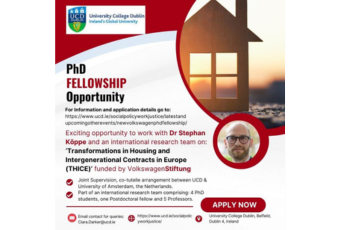Thank you for your message. The IPPA team will get back to you shortly. You first need to login here.



We are recruiting to fill one PhD fellowship (fees and scholarship) on a new international research project investigating Transformations in Housing and Intergenerational Contracts in Europe (THICE), funded by the Volkswagen Foundation. The PhD supervision will be supported by a joint, co-tutelle arrangement between University College Dublin in Ireland and the University of Amsterdam, the Netherlands. The successful applicants will be part of an international research team consisting of four PhD students, one postdoc, and five professors, working at the forefront of housing research within Europe. Through the collaborative approach and co-tutelle agreements, all PhD students benefit from advanced training workshops, practitioner exchanges and international networks to launch an international academic career.
The project:
The Transformations in Housing and Intergenerational Contracts in Europe (THICE) aims to deepen the understanding of how housing wealth is reshaping intergenerational relationships in Europe and to explore socially just solutions. Increasing housing inequalities with growing concentrations of wealth among homeowners, especially older ones, and diminishing access to affordable housing, especially among younger adults have affected European societies in recent decades. At the same time, there has been a revival of family dependencies and intergenerational transfers that sustain welfare and life-course transitions for younger generations. Intergenerational support, both financial and in-kind, has increasingly centred on housing with, for example, rising adult co-residence with parents and family assistance for people buying their first property. This marks a profound shift in the intergenerational contract. To investigate this restructuring of the intergenerational contract, the project applies a comparative, cross-disciplinary approach that integrates quantitative and qualitative analyses. Work packages 1 to 4 focus on analysing the institutional foundations of intergenerational relations, the varying meanings and practices of family and kinship and their intersection with housing and household formation, the intergenerational support and its outcomes, and the inequalities between and within generations in the context of housing. The final work package will develop visions of best practices for Intergenerational Housing Futures.
THICE is supported through the Volkswagen Foundation called ‘Challenges and Potentials for Europe: Intergenerational Futures’. Led by Humboldt University Berlin (Prof. Ilse Helbrecht), THICE brings together four research teams from the University of Amsterdam (Prof. Richard Ronald, Dr Rowan Arundel), University of Granada (Dr Ricardo Duque) and University College Dublin (Dr Stephan Köppe) to address the question of intergenerational fairness and housing wealth through a comparative, interdisciplinary and multi-scalar perspective.
The PhD position:
The PhD candidate will work on Work Package 4 entitled ‘WP4 Generational Inequalities’. WP4 takes a macro-level quantitative approach to examine inequalities between and within generations and the role of housing herein. WP4 examines how housing-related intergenerational dynamics translate into inequalities at the societal level. Assessing aggregated impacts of dynamics of intergenerational support provides essential insight into the impact of market and policy differences in terms of inequality outcomes.
Thus, the core question of WP4 is: To what extent does housing contribute to inter- and intra-generational inequalities within and across different contexts, and how has this changed over time?
WP4 will also analyse these dynamics comparatively across a wider range of EU countries, making use of several harmonized datasets. For instance, Gender and Generations Survey (GGS), Household Finance and Consumption Survey (HFCS), Survey of Health, Ageing and Retirement Europe (SHARE) and The Irish Longitudinal Study on Ageing (TILDA).
WP4 examines aggregated levels of inequality across key measures of housing (dis)advantage, assessing how these vary in and across generational cohorts, and interact with other socioeconomic dimensions. Tenure and housing wealth form core housing dimensions in our analyses alongside variables such as housing costs, housing quality and intergenerational proximity. The study will further examine how such housing-related dimensions interact with other socioeconomic inequalities (income, labour market position, education, non-housing assets/savings, gender, ethnicity, etc.), assessing how much housing dimensions either mitigate or amplify other inequalities. In understanding intergenerational dynamics, these inequalities will be assessed across the full population, within and between generations. Looking at variation across contexts, the study will go on to understand national differences and variations in macro-level inter- and intra-generational inequality in relation to the influence of specific housing policy and welfare systems.
Building on and collaborating with other work packages, WP4 provides a ‘big picture’ analysis of revealed and potential future dynamics of housing-related inter- and intra-generational inequalities and solidarity across Europe, as well as how institutional and policy features can undermine/sustain different forms of a successful intergenerational contract.
The PhD candidate will benefit from a co-tutelle agreement with the University of Amsterdam, resulting in a dual PhD degree. The PhD student will be under the primary supervision of Dr. Stephan Köppe at UCD (https://people.ucd.ie/stephan.koeppe) and co-supervision of Dr. Rowan Arundel at the University of Amsterdam (https://www.uva.nl/en/profile/a/r/r.i.m.arundel/r.i.m.arundel.html). While primarily based at UCD, it is expected the student will spend 3-6 months at the University of Amsterdam.
Expertise in quantitative data analysis is essential. Experience working with diverse and large datasets is beneficial. We welcome applications from candidates from a range of social science backgrounds including Social Policy, Public Policy, Sociology, Human Geography, Economics, and Public Administration.
Please click here to download the pdf with the complete details on how to apply for this position
Closing date for applications: 5 pm on Wednesday, 15 May 2024.
Start date: September 2024 or as soon as possible thereafter.
Interview date: envisaged 17/20th June (TBC)


Thank you for your message. The IPPA team will get back to you shortly. You first need to login here.